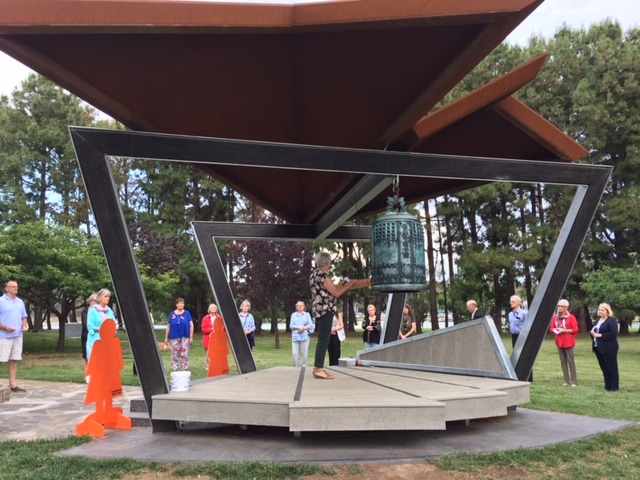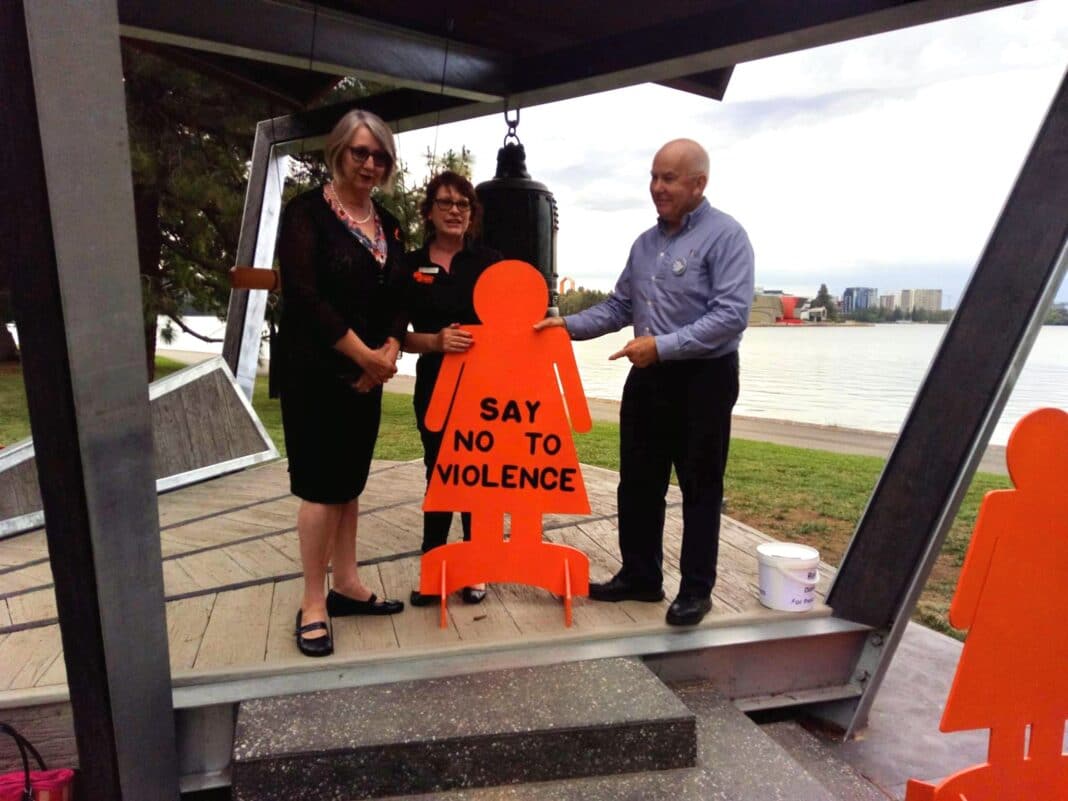Canberra landmarks are turning orange this month to draw attention to family and domestic violence. The Zonta Club of Canberra Breakfast – the local branch of an international women’s empowerment group – is launching its Zonta Says NO campaign, part of 16 days of global activism against gender-based violence.
Forty-five women in Australia alone have died this year because of violence at the hands of a partner or other family member. Almost one in three calls to the police involve an element of family violence, an ACT Policing spokesperson said; more than 1330 women and girls had been victims of family violence between January and the end of October, compared to nearly 490 men and boys. Coronavirus has escalated the problem: self-isolation, potential loss of employment, and travel restrictions are stress factors that could contribute to family violence, the spokesperson said.
Crisis services report that the number of people seeking help has increased this year; in the ACT, more than 300 new clients sought help from the Domestic Violence Crisis Service (DVCS) between March and April.
“Domestic violence is across all sections of our community,” DVCS interim CEO Glenda Stevens said. “It does not discriminate on grounds of socioeconomic status, on income, on cultural group.”
The Zonta campaign began on Wednesday, 25 November, the United Nations Day for the Elimination of Violence Against Women.
To raise awareness of gender-based violence, Zonta and the ACT Government are illuminating light rail stops, the Canberra Centre water fountain, and the Malcolm Fraser Bridge in orange.
Orange-themed floral exhibits have been installed in the Civic and Dickson libraries, each flower representing one of the dead victims of domestic violence.
Orange, Zonta member Serina Bird explained, is a colour for both Zonta and the UN Sustainable Development Goal 5: Gender equality – and gender inequality is at the heart of domestic violence.
“Violence is the result of an imbalance of power in a relationship, and that imbalance of power generally is the result of us living in a patriarchal-dominating society,” Ms Stevens said.
“There’s a belief that the man is right, that the man has more power and more say in a relationship, that he’s the stronger one who should be in charge – and therefore the wife should be submissive, quieter, and do what she’s told.”
Most people who use violence are men, Ms Stevens said; last month, of the people who sought help from DVCS, nearly all the people who used violence were male, and in heterosexual relationships. Again, according to ACT Policing figures, 297 men and boys were family violence offenders between January and the end of October, compared to 68 women and girls.
The Zonta campaign ends on International Human Rights Day, Thursday 10 December. On that day, the Canberra Rotary Peace Bell in Nara Park will be rung 45 times to commemorate those women who died over the past year due to family and domestic violence, Ms Bird explained. It will also ring once for the male victims.

The ceremony is deeply moving and sobering, Ms Bird said. ACT Government representatives and Senator David Smith MP are expected to attend, while musician Riley Lee will play his Japanese flute (shakuhachi).
The event is jointly organised by Zonta and the Rotary Club of Canberra Burley Griffin, and runs from 6.30am to 8.30am on 10 December. The event is free, but numbers are limited due to COVD-19. Book online through Humanitix; attendees can also donate to the DVCS.
Yvette Berry, Minister for Women and Minister for the Prevention of Domestic and Family Violence, said the 16 Days of Activism against Gender-Based Violence were an opportunity to get people thinking about how the community can reduce and ultimately eliminate domestic violence and violence against women.
Over the next fortnight, DVCS will share short stories on its social media platform about women working in the ACT who promote the elimination of violence against women.
This Friday, the DVCS will hold its Girls’ Night In – a fun night with friends to raise awareness of DVCS and celebrate Australian women.
In partnership with ANU, DVCS has online training videos about domestic, family and sexual violence, how to respond to disclosure, and what to do as a bystander.
DVCS encourages anyone who believes they may be experiencing domestic or family violence – whether as victim, perpetrator or witness – to phone their crisis line on 6280 0900, and talk to a counsellor. Calling is free, anonymous, and non-judgemental.
“I really stress that everybody has the right to live a life free of fear and violence,” Ms Stevens said. “If you are in a domestic violence situation, that is not your fault. You can contact us, and we can talk about how you can move to have a life that’s free of violence.”
DVCS also runs crisis intervention and support programs for young people, women and children in need, and can organise emergency accommodation and safety planning. Its Room4Change program supports men who use violence and want to stop.
ACT Policing encourages anyone experiencing family violence to contact police during the COVID-19 pandemic. In an emergency, phone 000. Or, for a police response, call the Police Assistance Line on 131 444. The Family Violence Coordination Unit can be contacted directly on 5126 9114. Police can also assist the perpetrators of family violence to change their behaviour.
Today and tomorrow, the ACT police will run their third operation this year to monitor recidivist offenders and keep victims safe.
Zonta also provides packs of kitchen essentials and supplies to domestic violence survivors moving into public housing, and supports Karinya House, a refuge and support centre for young mothers. Money is raised through its pre-loved fashion sale in March; this year, the club received a generous donation from the Snow Foundation.
To find out more about Zonta, visit zontaccanberrabreakfast.org/
For more information about DVCS, visit www.dvcs.org.au, or call 6280 0900.



